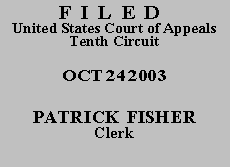

| AGGIE N. CARRILLO,
Plaintiff-Appellant, v. JO ANNE B. BARNHART, Commissioner of Social Security, Defendant-Appellee. |
|
Plaintiff Aggie N. Carrillo appeals from an order of the magistrate judge affirming the Commissioner's determination that she is not entitled to Social Security disability benefits.(1) After reviewing the Commissioner's decision to determine whether her factual findings were supported by substantial evidence in light of the entire record and to determine whether she applied the correct legal standards, we affirm. See Castellano v. Sec'y of Health & Human Servs., 26 F.3d 1027, 1028 (10th Cir. 1994).
Ms. Carrillo claims that she was disabled due to chronic low back pain. The relevant time frame for evaluating her disability claim is brief: June 1, 1998, the alleged onset date, through June 30, 1998, the date her insured status expired. See Henrie v. United States Dep't of Health & Human Servs., 13 F.3d 359, 360 (10th Cir. 1993) (stating claimant must establish onset of disability prior to date insured status expired). The administrative law judge (ALJ) concluded, at step five of the five-step sequential process, that Ms. Carrillo had the residual functional capacity to perform a range of light exertional level work during the relevant time period and that a significant number of such jobs existed in the national economy. See Williams v. Bowen, 844 F.2d 748, 750-52 (10th Cir. 1988) (describing the five-step test used by the Commission to evaluate disability claims). Therefore, Ms. Carrillo was not disabled before the expiration of her insured status and not entitled to benefits. A review of the administrative record shows that substantial evidence supported the ALJ's determination and that the ALJ applied the correct legal standards.
Ms. Carrillo argues on appeal that the magistrate judge erred by "bas[ing] her decision solely on what the [ALJ] had decided." Aplt. Br. at 2. She contends the magistrate judge should have taken additional medical records into consideration, even though her attorney had not submitted the records for inclusion in the administrative record.
On judicial review of a Commissioner's decision, a court is generally confined to the record before it. However, it may remand a case, "order[ing] additional evidence to be taken before the Commissioner of Social Security, but only upon a showing that there is new evidence which is material." 42 U.S.C. § 405(g) (emphasis added). "In order to find a remand appropriate, we normally must determine that the new evidence would have changed the [Commissioner's] decision had it been before [her]. Implicit in this requirement is that the proffered evidence relate to the time period for which the benefits were denied." Hargis v. Sullivan, 945 F.2d 1482, 1493 (10th Cir. 1991) (citations omitted).
Here, the proffered medical records, as attached to Ms. Carrillo's appellate brief, were generated from February 1, 1999, through October 22, 2002. Accordingly, they are not material to a determination of Ms. Carrillo's disability as of June 30, 1998, and would not have affected the Commissioner's determination. A remand of this case for a consideration of the additional evidence is unwarranted.
The judgment of the district court is AFFIRMED. The mandate shall issue forthwith.
Entered for the Court
Circuit Judge
*. This order and judgment is not binding precedent, except under the doctrines of law of the case, res judicata, and collateral estoppel. The court generally disfavors the citation of orders and judgments; nevertheless, an order and judgment may be cited under the terms and conditions of 10th Cir. R. 36.3.
1. The parties consented to proceed before a magistrate judge. See 28 U.S.C. § 636(c).